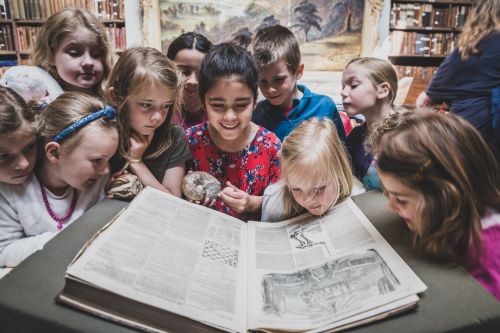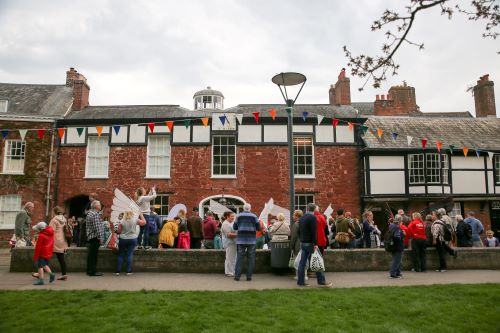Library of the Week: 11th April: We are really happy this week to feature the brilliant Devon and Exeter Institution Library! Sonia Llewellyn, (Librarian) tells us all about the library and its history, the collections available including the West Country and Heritage Collections as well as discussing plans for the future. Thank you so much for taking part!
The Devon and Exeter Institution is a thriving independent library and educational charity in the heart of the city, which welcomes new members and visitors of all ages. Our founders established the Institution in 1813, in order to promote ‘the general diffusion of Science, Literature and the Arts, and for illustrating the Natural and Civil History of the county of Devon and the History of the City of Exeter’. This resolution remains at the centre of our strategy to this day.
The Institution occupies a Medieval building, originally owned by the Cathedral. It was inherited by the Courtenay family in the 17th Century and used as their town house for over 150 years. In 1814, ‘200 Gentlemen of the City’ took ownership of 7 Cathedral Close and adapted the double-courtyard layout to create two elegant Georgian rooms. These rooms functioned as both library and a museum; museum objects were later donated to form the foundation collection of the Royal Albert Memorial Museum in 1868.

Today our two galleried libraries hold a unique historical book collection, virtually unchanged since 1813, and collections of maps, prints, drawings, fine and decorative art. The DEI is also the premier institution collecting books on Devon, particularly in the fields of history and biography. The Library and collections lie at the heart of the Institution and provide inspiration and a place for research and reading, educational activities, cultural events and lectures.

Heritage collection
The Library’s foundation collection includes science, mathematics and engineering, natural history, travel and exploration, art and architecture, music, literature, history and religion. The collection of bound volumes of local newspapers, some dating from the 18th century, is unique. There are many early illustrated books, maps, prints and drawings and a comprehensive holding of materials relating to the West Country dating from the 16th century. The Library also holds a large collection of pamphlets and tracts as well as long runs of 19th century periodicals.

Highlights include significant works on natural history, including Philemon Holland’s 1601 translation of Pliny the Elder’s The historie of the world: Commonly called, the naturall historie of C. Plinius Secundus, and prominent zoologist William Elford Leach’s Descriptions of such British species of the Linnean genus Cancer as have their eyes elevated on footstalks, published in 1815 and beautifully illustrated by James Sowerby. There are also early scientific and mathematical works, reflecting the intellectual and philosophical ideas of the Age of Enlightenment, and an important Voyages and Travel collection. You’ll also find early editions of literary treasures, by authors such as Austen, the Brontës, Dickens and Hardy.
West Country collection
We continue to collect publications relating to the history and topography of the West Country, including pamphlets and local journals and newsletters as well as the reports and transactions of societies and institutions. The Library also has an extensive collection of local newspapers on microfilm. For those of you interested in librarianship, this collection retains a unique classification system, designed by local history pioneer Professor W. G. Hoskins.
Our Region Revealed
With grants from the National Lottery Heritage Fund, The Pilgrim Trust and from Friends of Devon’s Archives we are making the Institution’s rich collection of prints and drawings accessible to a wider audience through preservation and digitisation and through our programme of learning and engagement activities for all ages.

Our Region Revealed: unlocking the treasures of The Devon and Exeter Institution illustration collection is an ambitious project to preserve, catalogue and digitise around 9,000 drawings, paintings, photographs and engravings. The rich collection includes sketchbooks, scrapbooks, portraits, political posters, trade cards of local businesses and drawings of buildings and landscapes. It offers a fascinating glimpse into the history of our region.
These are available to view online at: https://collectionsexplorer.devonandexeterinstitution.org/
The Next Chapter
The Devon and Exeter Institution has been awarded a grant totalling one million pounds to fund The Next Chapter project, to enable us to:
- create an enhanced welcome area, better access and upgraded facilities
- open-up the Institution’s front rooms and garden spaces for reading and events
- offer an enhanced programme of activities for all ages and abilities, including events for UNESCO City of Literature
- support essential conservation work, a collection review and the development of a long-term research strategy
Emma Dunn, Director of the Devon and Exeter Institution said:
’The vision for our project is to remove barriers for potential members and visitors by creating better access in all its forms – intellectual, cultural and physical. In this project, we will address the pressing need to reconsider the way we use space in the building; we will become more accessible and further develop our understanding of the collection and our capacity to enhance wellbeing and support pandemic recovery. Central to our project is the creative drive to engage with a wide range of people, as our founders intended in 1813.’
Visit the website at: https://devonandexeterinstitution.org/
Sonia Llewellyn, Librarian at the Devon and Exeter Institution
All images are copyright of the Devon and Exeter Institution, reproduced with kind permission of the copyright holder.
You can explore the library’s collections on Discover and find further contact details on their Discover information page.

